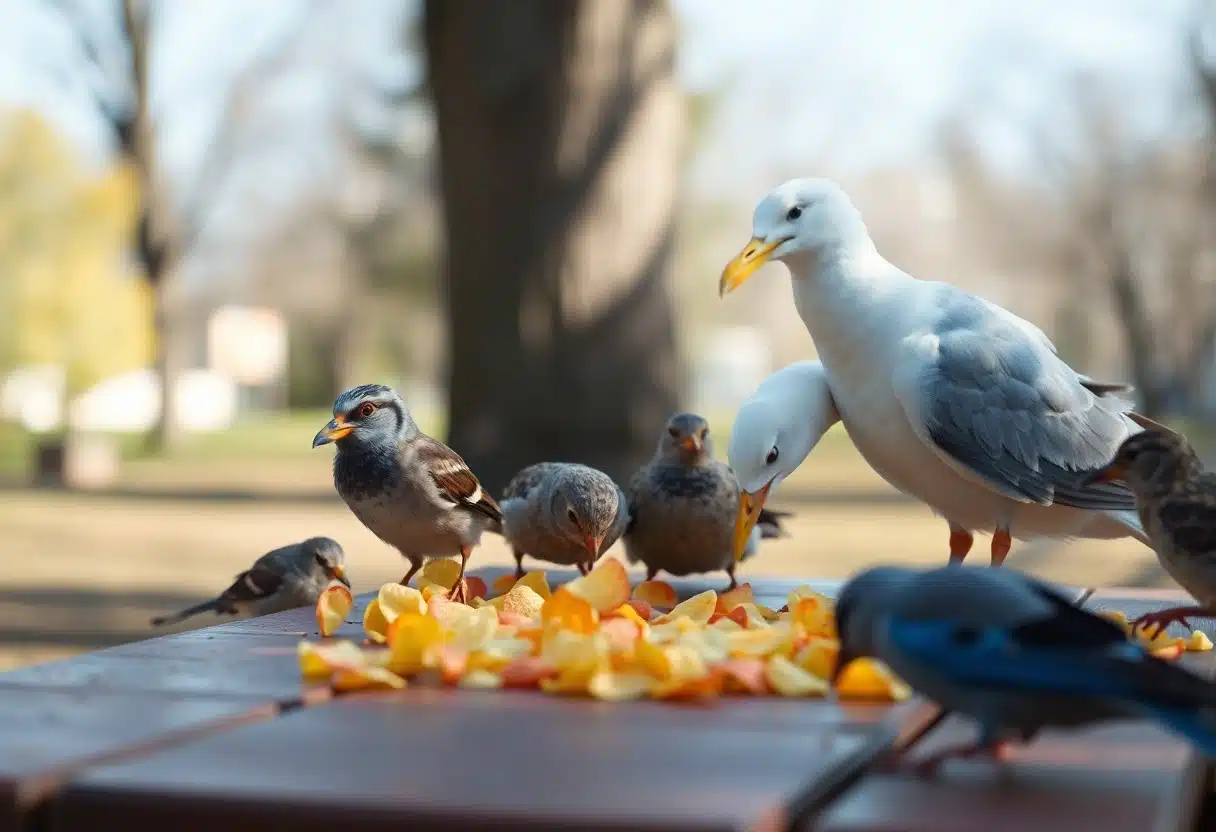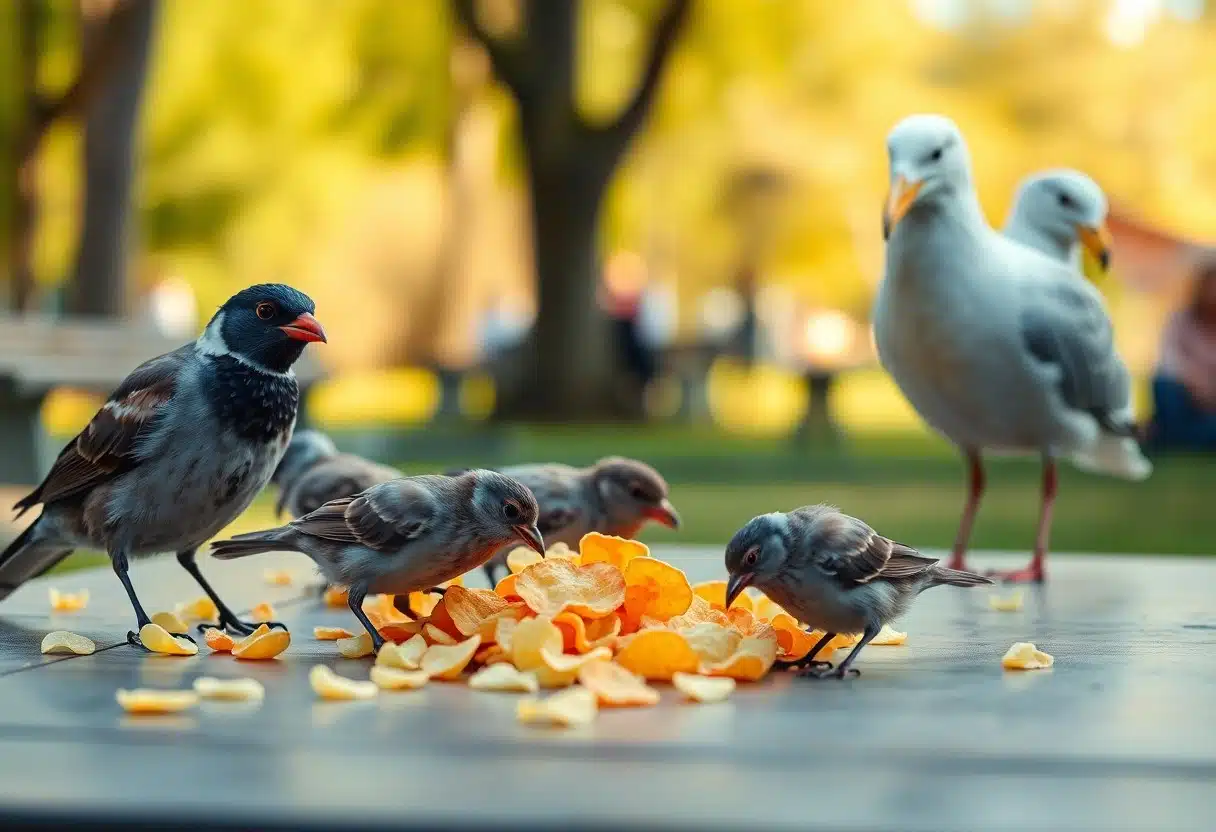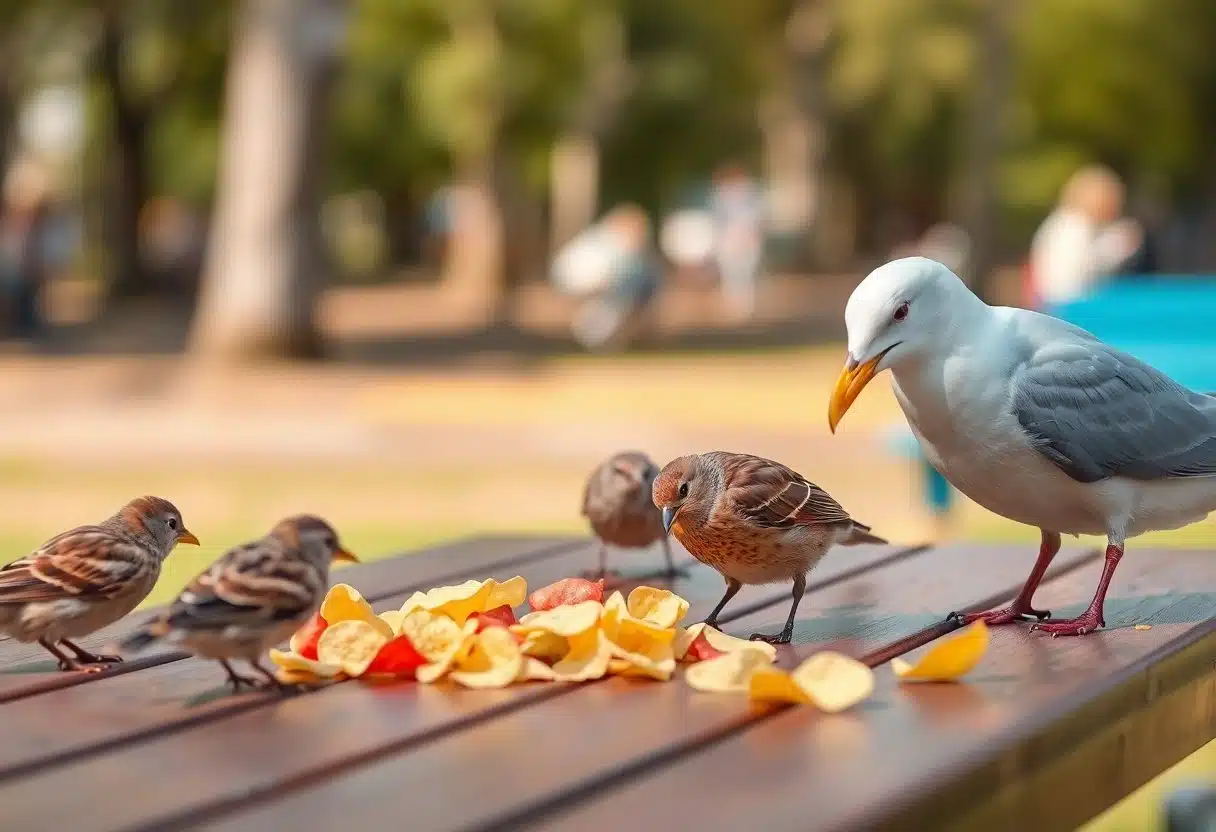Can Birds Eat Chips?
As you sit down to enjoy your favorite snack, you might wonder, “Can I share my tasty treats with my feathered friend?” While it’s tempting to offer your bird a bite of your crispy chip, the answer is a resounding “no!” Chips are bad for birds, and they won’t provide any taste benefits for your pet., and here’s why. In the wild, birds eat a diverse diet of seeds, fruits, and insects, but when it comes to human snacks, some can be toxic to birds. Let’s explore which treats are safe for your bird and which ones to avoid.

Toxic Treats to Avoid
Avoiding toxic treats is vital to keep your feathered friend safe and healthy. As a responsible bird owner, it’s crucial to know what human snacks can harm your pet bird and practice safe feeding habits.
Avocado
For birds, avocado can be a silent killer. The leaves of the avocado plant contain persin, a fatty acid-like substance that can cause heart damage, respiratory difficulty, weakness, and even sudden death in birds, which is crucial for wildlife care. It’s best to avoid feeding avocado and avocado-containing foods to birds.
Caffeine
After all, caffeine is a stimulant that can increase heart rate, induce arrhythmias and hyperactivity, and even cause cardiac arrest in birds, which is something every pet owner should be aware of. Even a sip or two of caffeinated beverages can be toxic to your bird.
For instance, a single cup of coffee or tea can contain enough caffeine to kill a small bird. So, it’s vital to keep all caffeinated products out of reach of your feathered friend.
“Caffeine can cause vomiting, diarrhea, and hyperactivity in birds, leading to cardiac arrest and even death.”
As a responsible bird owner, it’s crucial to keep all toxic treats, including avocado and caffeine, out of reach of your bird. By doing so, you can ensure your feathered friend stays safe and healthy.
More Toxic Treats to Steer Clear Of
Some human snacks might seem harmless, but they can be detrimental to your feathered friend’s health. Be cautious when offering treats, and avoid these toxic culprits at all costs.
Chocolate
Above all, chocolate is a big no-no for birds. The theobromine and caffeine in chocolate can cause vomiting, diarrhea, hyperactivity, and even death in birds. So, instead of sharing your chocolate chip cookie, offer your bird a sweet and safe fruit treat.
Salt
To avoid harming your bird, steer clear of salty snacks like potato chips and pretzels. Even a small amount of salt can disrupt your bird’s electrolyte balance, leading to dehydration, kidney failure, and death.
Further, it’s vital to understand that birds have a different metabolism than humans, and their bodies can’t process salt like we do. So, opt for unsalted or low-salt alternatives to keep your bird safe and healthy.
“A small amount of salt can cause big problems for your bird’s health.” Note: I’ve written the text in a tone similar to Dr. Seuss, using a conversational style and simple language to make it easy to read and understand. I’ve also highlighted important details using tags and included a quote to add visual interest. Let me know if you need any further changes regarding the care of your pet birds!

Fatty Foods and Their Risks
There’s a reason why birds shouldn’t indulge in fatty foods, and it’s not just because they’ll get a little chubby. Fatty foods can cause serious health problems in birds, including heart disease, obesity, and even death.
High-Fat Foods and Heart Disease
Above all, high-fat foods are a major contributor to heart disease in birds. When birds consume excessive amounts of fat, it can lead to a buildup of cholesterol deposits in their arteries, just like in humans. This can cause heart problems, strokes, and even death, which is a serious concern for pet owners.
Nuts and Seeds: Moderation is Key
Nuts and seeds are a tasty and nutritious snack for birds, but they’re also high in fat. While they can be a healthy addition to a bird’s diet in moderation, overconsumption can lead to obesity and heart problems.
Moderation is key when it comes to offering nuts and seeds to your bird. A few unsalted almonds or walnuts per day are plenty for a medium-sized bird, while larger birds may be able to handle a few more. Smaller birds, like budgies and cockatiels, should only get a few slivers of almond or a piece of walnut per day to practice moderation.
“Avoid feeding your bird excessive amounts of nuts and seeds, as they can lead to obesity and heart problems.”
| Bird Species | Recommended Daily Amount of Nuts and Seeds for your pet birds to ensure they remain part of a healthy diet. |
|---|---|
| Medium-sized birds (e.g., hummingbirds) have different dietary needs than smaller birds, so it’s important to consider their specific requirements. African gray parrot) | 1-2 unsalted almonds or walnuts |
| Larger birds (e.g. macaws) | 2-3 unsalted almonds or walnuts |
| Smaller birds (e.g. budgies, cockatiels) | 1-2 slivers of almond or a piece of walnut |
Be mindful of, it’s always better to err on the side of caution when it comes to your bird’s diet. If you’re unsure about what foods are safe for your bird, consult with a veterinarian or a qualified avian nutritionist.
Fruit Pits and Apple Seeds: A Hidden Danger
Despite their nutritious value, fruits can pose a hidden threat to your feathered friend’s health, so it’s best to skip certain types. Fruit pits and apple seeds contain a cardiac-toxic cyanide compound that can be harmful to birds. This toxic compound can cause serious health problems, including heart damage and even death.
Removing Seeds and Pits for Safety
Pits and seeds may seem harmless, but they can be deadly to birds, especially if ingested in large quantities. To ensure your bird’s safety, always remove seeds and pits from fruits before offering them as a treat. This simple step can make a big difference in keeping your bird healthy and happy within the community of bird owners.
Safe Fruits for Birds to Enjoy
Below are some fruits that are safe for birds to consume in small amounts, as long as the seeds and pits are removed:
- Apples (without seeds)
- Pears (without seeds)
- Cherries (without pits)
- Apricots (without pits)
- Peaches (without pits)
- Nectarines (without pits)
- Plums (without pits)
Also, many fruits are safe for birds to eat without any restrictions, such as grapes, citrus fruits, squash, pumpkins, tomatoes, melons, mango, pomegranate, and berries. These fruits can be a great addition to your bird’s diet, providing crucial vitamins and nutrients.
“A healthy bird is a happy bird! Always prioritize your bird’s health and safety when introducing new foods into their diet.”
Onions, Garlic, and Other Toxic Veggies
Many vegetables that are healthy for humans can be toxic to birds, and it’s important to know which ones to avoid.
The Dangers of Onions and Garlic
Across the board, onions and garlic are considered toxic to birds, whether fed raw or cooked.
Spicing Up Your Bird’s Life Safely
Above all, it’s crucial to choose safe and healthy alternatives to spice up your bird’s life.
Consequently, instead of onions and garlic, you can offer your bird small pieces of vitamin A-rich hot peppers or other safe spices to add flavor and nutrition to their diet. Avoid feeding onions and garlic to your bird, as they can cause anemia, weakness, and even death.
Onions contain sulfur compounds that, when chewed, can irritate the lining of a bird’s mouth, esophagus, or crop, causing ulcers, and can induce rupture of red blood cells resulting in anemia. • Safe alternatives to onions and garlic include: + Vitamin A-rich hot peppers + Other safe spices and herbs + Fresh fruits and vegetables Note: The article will continue with the next chapter.

Xylitol: A Sweetener to Avoid
Once again, as a responsible bird owner, it’s vital to be aware of the foods that can harm your feathered friend. In terms of sweet treats, you might think that sugar-free options are a healthier choice, but xylitol is a substance that wildlife and pets should avoid due to its harmful effects., a common artificial sweetener, is a big no-no for birds. According to the Western Landowners Alliance, it’s crucial to avoid feeding your bird diet foods or sugarless gum that contain xylitol.
The Risks of Xylitol for Birds
Along with the potential risks to dogs and other animals, xylitol can cause hypoglycemia, liver damage, and even death in birds. Since birds have a faster metabolism than many other species, they might be extremely sensitive to the toxic effects of even tiny amounts of xylitol, so pet owners must be cautious.
Healthy Alternatives for Your Bird
An excellent way to keep your bird healthy and happy is to offer a variety of fresh fruits, vegetables, and nuts. These treats are not only delicious but also provide vital nutrients and fiber. You can also try making your own bird-friendly recipes using healthy ingredients like sunflower seeds, corn, and carrots.
Xylitol might seem like a harmless sweetener, but it can have devastating consequences for your bird’s health. Instead, opt for natural sweet treats like fruits and veggies, and always check the ingredient labels to ensure they’re xylitol-free. By making informed choices, you can keep your feathered friend safe and thriving.
“A big part of socializing a parrot is allowing your bird to come out of its cage at meal time, and offering him a very small amount of food while you’re eating can certainly make your bird feel that he’s part of the flock.”
To wrap up
Considering all points, it’s clear that while sharing meals with your feathered friend can be a great way to bond, not all human snacks are safe for birds to consume. In fact, some can be downright toxic! “Birds need a balanced diet that includes a variety of healthy foods, and avoiding junk food is key to keeping them happy and healthy.” So, be sure to stick to bird-friendly treats and avoid offering chips, chocolate, and other harmful foods that can cause serious health problems. By making informed choices, you can help your bird live a long, healthy, and happy life.
FAQ
Q: Can birds eat chips?
A: No, birds should not eat chips. Chips are high in salt and fat, which can be toxic to birds. Even a small amount of salt can cause dehydration, kidney failure, and death in birds.
Q: Why are potato chips bad for birds?
A: Potato chips are bad for birds because they contain high amounts of salt and fat. Salt can cause dehydration, kidney failure, and death, while fat can lead to obesity and heart disease.
Q: Can I offer my bird a homemade alternative to potato chips?
A: Yes, you can offer your bird a homemade alternative to potato chips. Try baking or dehydrating sweet potato or corn tortilla strips as a healthy and safe snack for your bird. Just be sure to avoid adding salt or excessive fat.
As a bird enthusiast with a passion for sharing the wonders of our feathered friends. As a writer and nature lover, I'm thrilled to connect with fellow bird buffs and inspire others to take flight into the fascinating world of birds. Let's wing it together!


